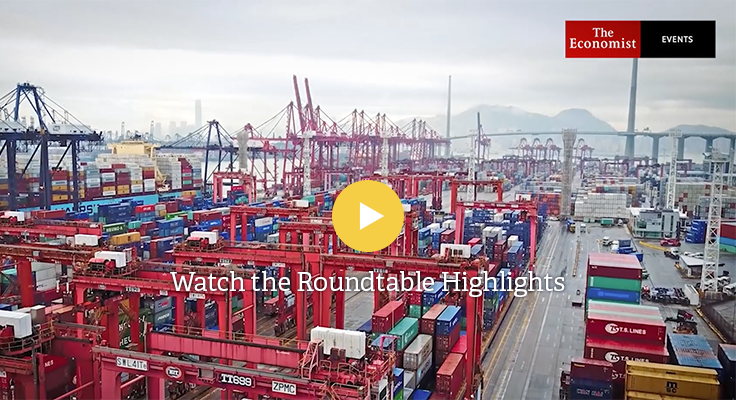In a roundtable discussion from The Economist’s Look Ahead series, supported by IEDC, the focus of the assembled business leaders was how to prevent supply chain shocks in manufacturing and other sectors. Key focuses of the discussion included lessons from the pandemic, the opportunities provided by technology, and some of the trade-offs in ensuring resilient supply chains.
Despite a 9 percent decline in global trade in 2020-21, the global trade system is working well according to Robert Koopman of the WTO, who set the scene for the discussion. While fiscal policies in the developed world have propped up large parts of the system, there has been a change in the composition of trade—an increase in some consumer goods and e-commerce, but a decline in services. Contrary to expectations during the covid-19 pandemic, countries on the whole took more liberalising measures than restricting ones.
Looking towards some of the trade-offs from the changing nature of global trade, Brock Herr of IEDC has found that suppliers in Indiana have faced increased cost pressures from sustainable processes, or more local production. However, IEDC has been able to support some businesses needing to pivot to different manufacturing processes during the pandemic. While reshoring of manufacturing has begun to happen in cases where final assembly can be done closer to the delivery location, Chip Gear of The Technology House argues the focus has remained on international supply chains.

For Srisu Subrahmanyam of ADESA, the car marketplace, the pandemic forced behavioural changes in the digital realm that are here to stay, with five years’ worth of leapfrogging happening in five months. It’s been a driver of revenue, too, increasing access for many new consumer segments. Jim Miller of CSS International echoed the emphasis on digitisation, citing around 30 percent of CSS’ clients wanting to accelerate their digitisation in the midst of the covid-19 Pandemic. The covid-19 pandemic has been an accelerant to many other businesses, including BioCellection, who have experienced an uptick in interest for their chemical recycling upcycling services, and Chip Gear of The Technology House who has found that the pandemic has speedup the approvals and regulatory processes for a number of products they had begun to produce through additive manufacturing, which is now the jewel in the crown of the business.
Technological Innovation: Powering Forward
New technologies are powering HyALTA Aeronautics’ investments in unmanned autonomous multi-use drones, which offer a powerful last-mile delivery solution – all produced through additive manufacturing. Since covid-19, many regulatory hurdles have vanished, paving way for wider uses of these new technologies. Michael Gleeson of Arcadia.io has found the pandemic has increased interest in adopting machine learning and AI in healthcare, traditionally an industry which is slow to Adapt.
Climate Risk: The Next Shock
As Vijay Vaitheeswaran of The Economist outlined, companies are now struggling with a risk that is hard to quantify on a spreadsheet: climate risk. As Jim Miller of CSS International highlighted, the most easily quantifiable and immediate risks will be the impacts on taxation and government policy, while the risks from a changing climate will take longer to eke out. Many businesses should take advantage of these immediate changes, highlighting the example of government incentives changing the way carpet manufacturers are producing their carpets using recyclable materials.